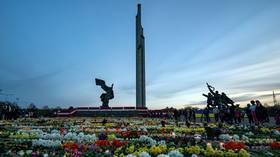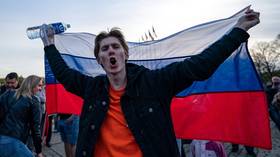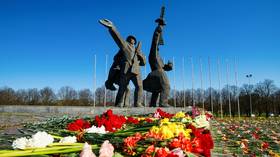Protests kick off over plans to demolish WW2 memorial

Several hundred people attempted to gather outside Riga’s town hall on Friday as the legislature in the Latvian capital convened for an extraordinary meeting to consider demolishing a monument to Soviet soldiers who liberated the city from Nazi occupation. The move was ultimately supported by an overwhelming majority of lawmakers.
Three members of the Latvian Russian Union party, including the party’s co-chair and member of the European Parliament Tatiana Zhdanok, were briefly detained during the protest outside the town hall. Technically, the politicians were not protesting as they were seen holding placards warning citizens that the gathering had not been authorized by the authorities.
All in all, seven people were detained during the demonstration for a variety of offenses, including “petty hooliganism.” Some wore black-and-orange St. George’s ribbons, which were used on Soviet WWII victory medals, and were detained for displaying unspecified “symbols of glorification of military aggression” in public.
More protesters showed up in the city center after the decision to demolish the memorial was supported by 38 legislators, with only eight voting against. Those opposing the demolition were confronted by supporters of the move, comprising Latvian nationalists and pro-Ukrainian activists. Though the groups engaged in verbal spats, no physical confrontations were reported.
Some counter-protesters attempted to distribute leaflets, fashioned as a ‘ticket’ out of the country. The ‘tickets’ referred to the ‘passenger’ as a “vatnik” – a cotton-wool-padded jacket – a derogatory term commonly used to insult supporters of the Russian government and Russians in general.
The monument to the Soviet liberators of Riga has long been targeted by Latvian nationalists, who have called for its destruction for decades. The site was the subject of a renewed bitter spat between local residents and the authorities during the recent Victory Day celebrations.
Latvian authorities declared May 9 – when V-Day is celebrated in Russia and some other countries – a day of mourning for those who died or were wounded during the ongoing Russian offensive in Ukraine.
Numerous people still attended the monument to lay flowers, which were swept away the next day. The move sparked a public outcry, with people returning to the site with even more flowers on May 10.
The back-and-forth surrounding the Riga monument prompted the central government in Latvia to act. On Thursday, the country’s parliament overwhelmingly voted to unilaterally renounce part of a treaty with Russia, in which Latvia pledged to protect and maintain war memorials in the country. The move paved the way for the demolition of the memorial, as well as for the potential destruction of other Soviet-era monuments in the country, a quarter of whose citizens are predominantly Russian-speaking.















